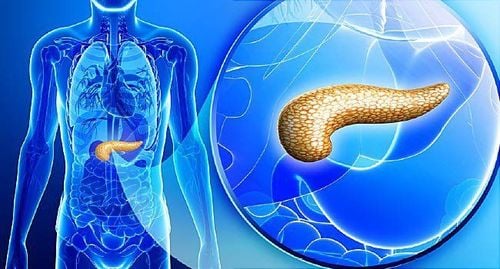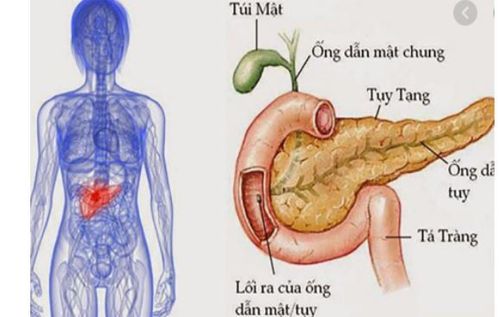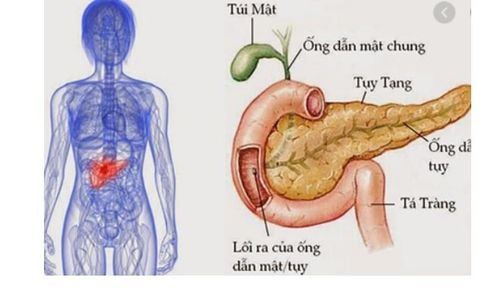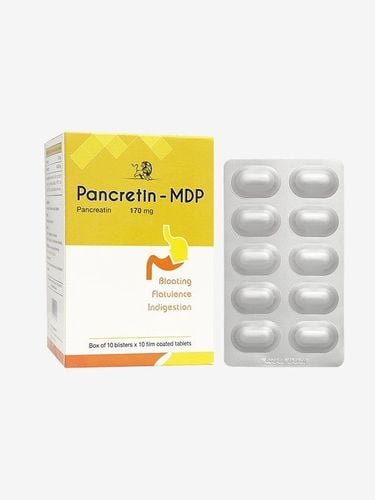This is an automatically translated article.
Post by Master, Doctor Mai Vien Phuong - Gastrointestinal Endoscopy - Department of Medical Examination & Internal Medicine - Vinmec Central Park International General Hospital.
Exocrine pancreatic insufficiency (EPI) is a condition that occurs when your pancreas cannot produce or secrete enough digestive enzymes to break down food and absorb nutrients. Because there are no exact symptoms, it is difficult to detect in the early stages of the disease.
1. What is the pancreas?
The pancreas is the organ that makes digestive enzymes and hormones. The pancreas has 3 parts, they are:Head of the pancreas Pancreatic tail The body of the pancreas. Digestive enzymes and hormones produced in the pancreas travel from the pancreas to the duodenum (first part of the small intestine) through a tube called the pancreatic duct. The place where the pancreas produces hormones is called the endocrine pancreas, and the place that produces digestive enzymes is called the exocrine pancreas.
2. What is the cause of exocrine pancreatic insufficiency? Anything that disrupts the normal process of digestive enzymes leaving the pancreas can cause exocrine pancreatic insufficiency.
Pancreatitis that does not improve with time and cystic fibrosis are the most common causes of exocrine pancreatic insufficiency. Other conditions that cause exocrine pancreatic insufficiency may be genetic, a bowel disorder, or a side effect of surgery.
Factors associated with exocrine pancreatic insufficiency include:
Cystic fibrosis Chronic pancreatitis Pancreatic or stomach surgery Diabetes Celiac disease Inflammatory bowel disease such as Crohn's Autoimmune pancreatitis Pancreatic cancer Syndrome Zollinger-Ellison

3. Signs and symptoms of exocrine pancreatic insufficiency When the pancreas is working properly, the enzymes that help the digestive system as well as break down food and absorb nutrients are working properly. Exocrine pancreatic insufficiency (EPI) is a condition that occurs when your pancreas cannot produce or secrete enough digestive enzymes to break down food and absorb nutrients. Fat digestion is most affected.
You may experience symptoms such as bloating, abdominal pain and diarrhea. Severe exocrine pancreatic insufficiency can lead to symptoms of weight loss, diarrhea, and malnutrition.
Because exocrine pancreatic insufficiency makes it harder for your body to break down food, you'll have symptoms similar to other digestive conditions. Symptoms include:
Bloating Stomach bloating: When gut bacteria ferment unabsorbed food, they release hydrogen and methane, causing gas and bloating. Diarrhea: The digestive system cannot break down fats and nutrients. Abdominal pain Weight loss: Even if you are eating a normal amount of food, exocrine pancreatic insufficiency can lead to weight loss. This happens because the body doesn't break down food into smaller forms that your digestive system can use. You can also lose weight by eating less to avoid the unpleasant symptoms of exocrine pancreatic insufficiency. Vitamin deficiency and malnutrition: Pancreatic enzymes break food down into small molecules that your body can absorb into your bloodstream. When exocrine pancreatic insufficiency prevents the digestive system from breaking down food, the body cannot use those nutrients and vitamins. Because there are no exact symptoms, it is difficult to detect in the early stages of the disease. Symptoms become more severe when 90 percent of the pancreas's normal ability to produce enzymes is gone. At this point, you are more likely to have obvious symptoms related to exocrine pancreatic insufficiency. The characteristic symptoms of exocrine pancreatic insufficiency in the severe stage are weight loss and loose stools.
4. Can exocrine pancreatic insufficiency be prevented? Many conditions associated with exocrine pancreatic insufficiency, including cystic fibrosis, diabetes, and pancreatic cancer, cannot be controlled.
But there are some factors that you can control. Heavy and persistent alcohol use is the most common cause of ongoing pancreatitis. Combining alcohol use with a high-fat diet and smoking can increase your chances of developing pancreatitis. People with pancreatitis from heavy alcohol use tend to have severe stomach pain and develop exocrine pancreatic insufficiency more quickly. Therefore, it is best to follow a scientific diet, healthy lifestyle and should not drink alcohol or limit alcohol intake.
In summary, the symptoms of exocrine pancreatic insufficiency are similar to many other digestive conditions. However, if you have unexplained weight loss, diarrhea, and fatty stools, it is very likely that exocrine pancreatic insufficiency is causing those symptoms. In this case, you should go to a medical facility for examination and treatment advice.
Please dial HOTLINE for more information or register for an appointment HERE. Download MyVinmec app to make appointments faster and to manage your bookings easily.
References:Capurso, Gabriele. (2019, March). Exocrine pancreatic insufficiency: prevalence, diagnosis, and management. ncbi.nlm.nih.gov/pmc/articles/PMC6432881/ Domínguez-Muñoz, JE. (2011, February). Pancreatic exocrine insufficiency: Diagnosis and treatment. DOI: 10.1111/j.1440-1746.2010.06600.x/full Juckett, G. (2011, November 15). Evaluation of chronic diarrhea. aafp.org/afp/2011/1115/p1119.html Keller, J, et al. (2015, September 14). Diagnosis of pancreatic exocrine insufficiency in chronic pancreatitis














